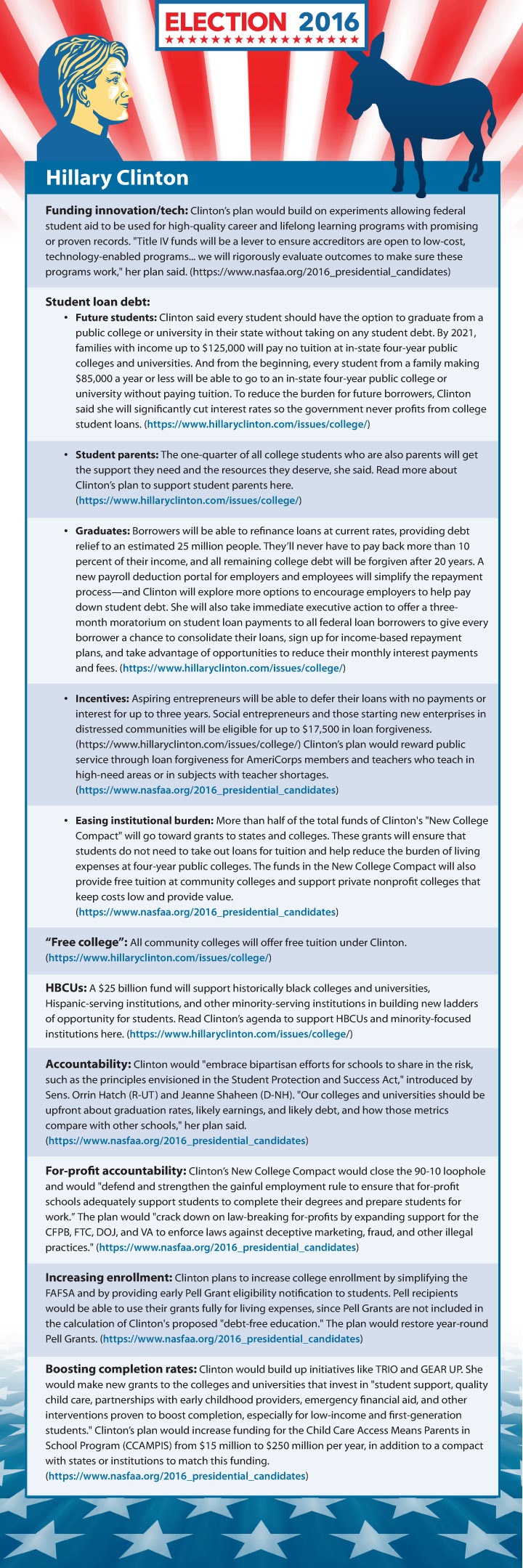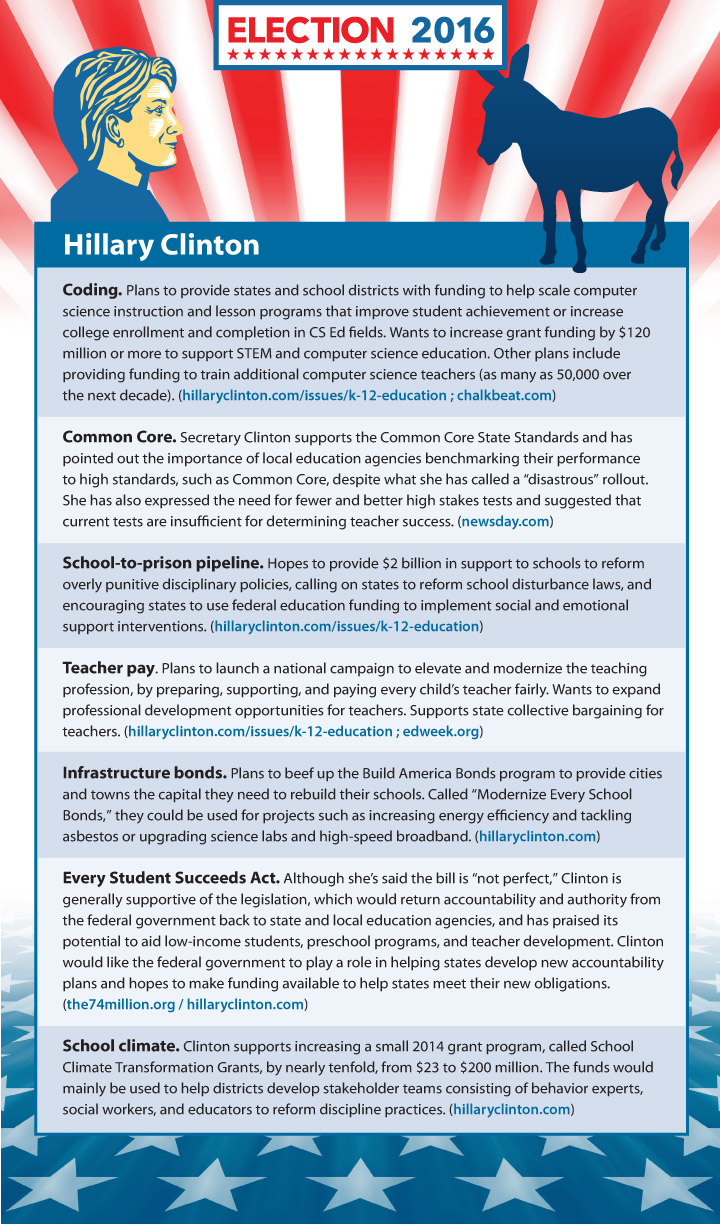K12 platform presidential candidates
Here’s where Hillary Clinton and Donald Trump stand on the biggest K-12 issues


++++++++++++++++++++
more on presidential election in this IMS blog:
https://blog.stcloudstate.edu/ims?s=election
Digital Literacy for St. Cloud State University


++++++++++++++++++++
more on presidential election in this IMS blog:
https://blog.stcloudstate.edu/ims?s=election
http://news.nationalgeographic.com/news/2005/08/0822_050822_chinese.html
Richard Nisbett, a psychologist at the University of Michigan in Ann Arbor.
http://www.newscientist.com/article.ns?id=dn7882
Cheung notes that children in China consistently score higher on academic tests compared to children in the U.S. and Mexico. But she says more research is needed to determine how much of that is due to the storybooks or even to the larger differences in cultural values that the books reflect. Other completely unrelated factors, such as different teaching techniques could be at work.
In the meantime, Cheung says her study suggests all three cultures might have something to learn from each other.
For instance American parents might want to take a cue from Chinese storybooks and supplement their children’s reading with more tales that promote a view of intelligence as changeable.
After all, says Cheung, if you think intelligence is gained through effort, then when you’re confronted with a challenge or even an outright failure, “you just put more effort into it. You try to learn from the experience and you think about different ways of approaching the problem rather than saying, ‘No, I’m just not smart and I’m just going to give up right away.'”
Spring 2016 technology Sessions available |
|
|
Student’s relationship with technology is complex. They recognize its value but still need guidance when it comes to better using it for academics. |
Educause’s ECAR Study, 2013 |
InforMedia Services |
|
| IMS faculty would be happy to meet with you or your group at your convenience. Please request using this Google Form: http://scsu.mn/1OjBMf9 or by email: pmiltenoff@stcloudstate.edu | informedia@stcloudstate.edu |
|
How you can reach us:
Services we provide:
|
|
+++++++++++++++++++
SOCIO-INT15- 2nd INTERNATIONAL CONFERENCE ON EDUCATION SOCIAL SCIENCES AND HUMANITIES will be held in Istanbul (Turkey), on the 8th, 9th and 10th of June 2015 is an interdisciplinary international conference that invites academics, independent scholars and researchers from around the world to meet and exchange the latest ideas and discuss issues concerning all fields of Education, Social Sciences and Humanities.
Socioint15_Accepted_Abstracts1
SOCIO-INT15 provides the ideal opportunity to bring together professors, researchers and high education students of different disciplines, discuss new issues, and discover the most recent developments, new trends and researches in education, social sciences and humanities.
Academics making efforts in education, subfields of which might include higher education, early childhood education, adult education, special education, e-learning, language education, etc. are highly welcomed. People without papers can also participate in this conference as audience so long as they find it interesting and meaningful.
Due to the nature of the conference with its focus on innovative ideas and developments, papers also related to all areas of social sciences including communication, accounting, finance, economics, management, business, marketing, education, sociology, psychology, political science, law and other areas of social sciences; also all areas of humanities including anthropology, archaelogy, architecture, art, ethics, folklore studies, history, language studies, literature, methodological studies, music, philosophy, poetry and theater are invited for the international conference.
Submitted papers will be subject to peer review and evaluated based on originality and clarity of exposition.
Based on the literature regarding games, gaming, gamification, game-based learning, and serious games, several clear trends emerge:
Recommendations for LRS
Will students be wearing their tech in virtual classrooms in five years? Wearable devices, adaptive technologies, and the Internet of Things are just some of the new tech researchers say is shaping the near future of higher education.
In 1 Year or Less: BYOD and the flipped classroom.
“Employers and higher education institutions are finding that when given the opportunity to choose their device, users are saved from the effort and time needed to get accustomed to new devices and can therefore accomplish tasks with more ease and efficiency.”
“Flipped learning is seen as especially suited for higher education because the rearranging of class time gives students in large introductory lecture courses more opportunity to engage and interact with their peers.”
In 2-3 Years: Makerspaces and wearable devices.
Makerspaces have the “benefit of engaging learners in creative, higher-order problem solving through hands-on design, construction and iteration.”
“Wearable technology is poised to see significant growth in the coming years, spurring experimentation in higher education because the demand for wearables is seen to be coming in large part from college-aged students.”
In 4-5 Years: Adaptive technologies and the Internet of Things.
“Adaptive technology is seen as a means to break free of a “one-size-fits-all” approach to education and is suited well for online and hybrid learning environments, “where student activities are conducted virtually and can be monitored by software and tracking applications.”
The Internet of Things pushes information to learners from their surroundings. “For instance, a learner exploring a city with a rich historical past can explore their environment through an architectural, political, or biological lens, depending on how the surroundings are equipped.”
From the NMC Horizon Report 2015: Higher Education Edition
Diane Ravitch blog on Anthony Cody’s book about his efforts to educate Bill Gates. The book is called “The Educator and the Oligarch: A Teacher Challenges Bill Gates.”
Anthony Cody is a teacher. For Cody, teaching is not just a job. It is his profession. It is his way of life. It is the place where his brain, his life experience, and his heart are joined.
With his blog as his platform, he trained his sights on the Gates Foundation. While others feared to criticize the richest foundation in the United States, Cody regularly devoted blogs to questioning its ideas and programs. He questioned its focus on standardized testing. He questioned its belief that teachers should be judged by the test scores of their students. He questioned its support for organizations that are anti-union and anti-teacher. He questioned its decision to create new organizations of young teachers to act as a fifth column within teachers’ unions, ready to testify in legislative hearings against the interests of teachers and unions.
http://mobile.nytimes.com/2014/08/17/opinion/sunday/teaching-is-not-a-business.html
Business does have something to teach educators, but it’s neither the saving power of competition nor flashy ideas like disruptive innovation.
While technology can be put to good use by talented teachers, they, and not the futurists, must take the lead. The process of teaching and learning is an intimate act that neither computers nor markets can hope to replicate. Small wonder, then, that the business model hasn’t worked in reforming the schools — there is simply no substitute for the personal element.
per LinkedIn discussion: http://www.linkedin.com/groupAnswers?viewQuestionAndAnswers=&discussionID=5822757351727316994&gid=2038260&goback=%2Enmp_*1_*1_*1_*1_*1_*1_*1_*1_*1_*1#commentID_null
Don Fitchett☆☆☆☆☆ Industrial Automation Training – Industrial Training software to Maintenance, Engineering, Manufacturing.Top Contributor
Schools and companies commonly use the word “Training” when actually all they are delivering is scholastic education. Our company clearly distinguishes between the two which increases our effectiveness and to differentiate what we deliver to customers (what most call students) from others like colleges. I thought it would be interesting to get this group’s members opinion on the difference between “Training” and “Education”, and to get group members thinking about it.
Director of the UPCEA Center for Online Leadership and Strategy – and – UIS Associate Vice Chancellor of Online Learning
This is one of those questions, the answers to which will be easy to pick apart. But, I will venture a beginning:
Training is task-oriented. It is circumscribed by circumstances such as location, goal, job, career. Training’s intent is to master a task, method or approach.
Education is a broader activity that spans locations, goals, careers. Education’s intent is life guiding, life changing and lasting.
Training can have lifelong import. But, the focus is on a specific task or goal.
Education often includes task-learning.
Enough. A more important task now demands my attention – breakfast – I have been trained well for this lifelong task.
-ray
Executive Director at SCI-EDUCATION SYSTEM,LONDON UK
Training direct develop skills for different profession but education reflects research and update knowledge.
Faculty at American InterContinental University
When asked the difference between education and training, a 4-star general replied…do you want your daughter to have sex training or sex education? Nearly everyone in the audience (1,000+) fell out of there seats. After the laughter subsided, the general went on to reply “fundamentally, education is focused on developing critical thinking skills (know why) that help enable creative solutions, whereas training is about developing specific skill sets (know how) for consistently reliable results.” That said, while there is a large grey area between training and education, per se, when does education stop and training begin, the outcome of both is learning. As a former Air Force flight instructor, I told my students they are educated in the aerodynamics of flight, but trained on how to fly.
Workplace Performance Improvement, Training, Instructional Design, Independent Writer
I just finished reading The Eden Conspiracy: Educating for Accomplished Citizenship by Joe Harless (1998). He explains (p. 157): “Training and education are often differentiated by saying education is to provide knowledge for unpredictable circumstances; training is for predictable circumstances.”
He also states education is provided in school, (K-college) and training is provided after school (knowledge and skills provided on-the-job). Since Harless published this book, the delivery options of education and training has changed, thanks to the Internet. Education and training can occur anywhere, and without proper context, someone can mix the labels and confuse being trained for a specific task with being educated about something they can use to determine if they should use the task they’ve been trained on.
Harless, J. (1998). The Eden Conspiracy: Educating for Accomplished Citizenship . Wheaton, IL: Guild V Publications.